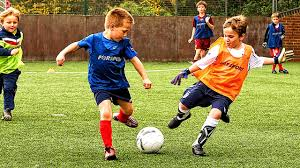Teaching very young children football poses many challenges include physical and mental understanding. From overall immaturity to short attention spans and lack of motivation, not to mention the physical limitations, many coaches feel at a loss as how to help the youngsters learn to play the game. However, if you can change your mindset to focusing on having fun, supporting physical fitness, social skills and football know-how, they will be well prepared if they decide to continue to the next level. At a young age the children just want to be out running around with their friends. Here are a few things for you to consider.

Learning the basics
As a coach, your goal is to introduce your young players to the basic football concepts of dribbling and kicking and to make it as fun as possible. This means, no long complicated drills, no repetitive drilling and plenty of breaks. Small children learn new tasks by watching and doing, so put away the lecture notes and blackboard and just play. Making your drills as interactive as possible helps the children to learn, as at these young ages you often find that they learn best through doing, rather than listening and watching.
Is winning important to a four-year-old?
As we all know, small children like to win and can be inconsolable if they don’t, however, the football field isn’t the place to let rules and fair play slide for the sake of tears. Playing football at an early age can be a great way to introduce kids to the concept of winning and losing and of course, to fair play. Any competitive matches should focus on playing better than last time, rather than winning. This is where it is important to create a team atmosphere as young children are also very good at blaming others when they don’t win and this can be difficult for some children to deal with.

Give everyone a chance
It’s so important with young children to recognise the huge disparity in ability between the ages. This means that if you have five-year-olds and six-year-olds playing together, the older children are going to be far more advanced. Despite your desire to win, make sure the older children are encouraged to support the younger children. Set a touch limit on games in practice to make sure everyone gets a kick. You should also give all of the players that regularly attend training sessions a fair chance when it comes to matches. There is nothing more soul destroying for a child than to practice hard every week and still not get picked to play in a match with their friends.
Stay focused
While many coaches of adult football will also complain about short attention spans, with small children this is the rule rather than the exception. Avoid making children line up to practise because by the time their turn comes they will have forgotten what they were meant to do. And remind them that they are a team with Football Kits from suppliers such as www.kitking.co.uk/ This can be the most challenging part of training young children as they will often all run towards the ball at once. Having regular practice games during your training sessions will help with this.
Most importantly, make sure you know the association rules for this age group inside out because one thing is guaranteed, once they start playing the kids won’t.



